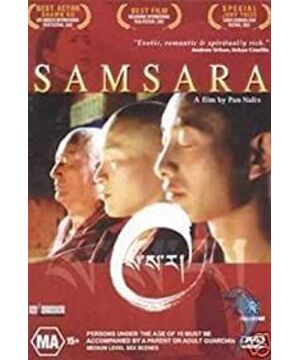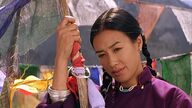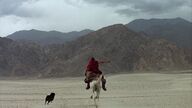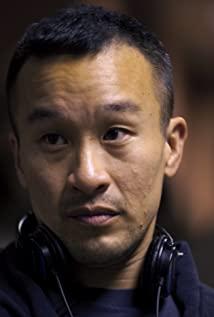Let's talk about Lust and Caution first. The "Lust and Caution" I'm talking about is this film by the screenwriter: Nalin Pan / Tim Baker, and the director is India's Nalin Pan and Christy Chung. The film, not Ang Lee's adaptation of Zhang Ailing That ring. I like this one better.
This movie is also called "Reincarnation", I think the translation of this name is better than Lust Caution. Moreover, the mainland categorizes this film with profound Buddhist teachings as pornography, which is really unacceptable. Maybe most of the people who watched this film just wanted to see Christy Chung's beauty, so many lechers took such a good film into a misguided way. Just from the director's seven years to make this film is enough to explain its depth.
"Reincarnation" tells the story of a well-practised monk Dashi in the Himalayas, who was born into the world because of his confusion about Buddhism and life, and finally realized the story. In the world, he met Parma, and She enjoys everything in life. On the other hand, Parma is the one who achieved his Buddha-nature.
Darcy's thinking in the film points directly to human nature. He believes that before Sakyamuni became a monk, he had already experienced everything that a human being should experience, including a wife, children, glory, and wealth. Because he owned all of them and knew the taste of it, he was able to realize the Tao. And I, Darcy, have never experienced it, how can I enlighten me?
I remembered a sentence, "It is extremely gorgeous, but it is dull in the end." It has never been gorgeous, how can it be attributed? I think this is also Darcy's doubts.
So Darcy retired from the monk's robe, resolutely returned to the secular world, pursued the woman he liked, had children, enjoyed love, family affection, and lived the same life as ordinary people.
This is the first question. Are there things in life that you have to go through? Is the premise of giving up a must have? And another question that is derived from this is even more challenging - when standing on the edge of the cliff of abandonment, can everything be calm and unrestrained?
Think about it. . .
When Darcy's heart was sprouting, an old monk appeared in the film. He showed Darcy some erotic paintings. From the front, it was a living person. From the back, the beauties were some skeletons. The old monk smiled secretly. . This reminds me of the mirror in "A Dream of Red Mansions", which is somewhat similar in purpose. Its name is Fengyue Baojian.
But Darcy didn't realize it, and he went to experience the eating and drinking of men and women in the secular world.
Another esoteric question appeared in the letter that Darcy's master left him before his death,
"...when we meet again in the future, I want to hear your answer: which one? Better? Satisfy a thousand desires? Or overcome just one of them?"
Desires breed desires, endlessly. . . how to choose? When to choose?
The third question is engraved on the stone: How can a drop of water not dry up?
The answer to the film is: let it flow into the sea.
It's not as simple as the language says. Too deep for words.
A game between Parma and the children in the film is like a prophecy.
They put a twig in the water, and Parma asked them what would happen to the twig? It would sink, the children said. If not? It will be blocked by stones! If not? You'll get tangled in branches! What if not? The children were speechless. In the end, Parma said, in that case, this twig will reach the sea.
The last question, Darcy broke off his desires, left his wife and children, and was born. What about poor Parma? Who can consider her feelings and life? When the Buddha became a monk, his wife and children went to find him, but he disappeared. I have no way of knowing his mood. But I believe that the Buddha's heart that has been cultivated is still painful as it should. Otherwise, I can't understand.
Let's compare Red Mansions with this film. The first question is, when Baoyu was traveling in the illusory realm, Fairy Jinghuan responded to Ning Rong's request to enchant Baoyu, and made him have the beautiful sisters Keqing and Baoyu Wushan Yunyu. Baoyu did not understand. Still among the secular sisters lingering in the Grand View Garden. This sentence in the book "sees color because of emptiness, generates emotion from color, conveys emotion to color, and realizes from color to Wukong." Is it somewhat similar to the first question above? Are there things in life that you have to go through? Is the premise of giving up a must have? When standing on the edge of the cliff of abandonment, can everything be cool and calm? And Baoyu also became a monk after experiencing all kinds of things. But problems still exist, and it is worth continuing to explore. Buddhism, from Sakyamuni to Nagarjuna, all pay attention to the middle way. Neither ascetic nor indulgence. Is it the Buddha's mind that came out of the world or the mind of entering the world?
The second question, which one is better? To satisfy a thousand desires? Or to overcome just one of them? Such as Baoyu's intelligence, if he comprehends the enlightenment of Jinghuan Fairy, he can immediately let go of the attachment that feels refreshing when he sees a woman, and turn to monkhood and practice, then how should the Dream of Red Mansions be written? Then the heart-wrenching love of Baodai would not exist, and the spiritual union of Darcy and Parma in the reincarnation would not bring people to think about it, right? Buddha-mind is not just as simple as destroying human desires. Desire is human nature.
The third question, how to keep a drop of water from drying up? let it flow into the sea.
Did Baoyu's ordination flow into the sea? The individual flows into the sea, so what is the significance of the precious jade as a drop of water in the sea? Does not dry up, does it represent the body or the spirit? The sea represents whether the wisdom of Prajna is like the sea or the sea where the water droplets gather together. If so, what is the difference between it and the sea of people?
The true meaning of life, the true meaning of practice, the true meaning of renunciation, the true meaning of the Buddha's mind, can really be explained clearly in a few words? What will be the end of the pursuit of humanity?
I think, I still need to slowly understand the words of Master Hongyi on his deathbed: "Sorrows and joys are mixed."
View more about Samsara reviews










